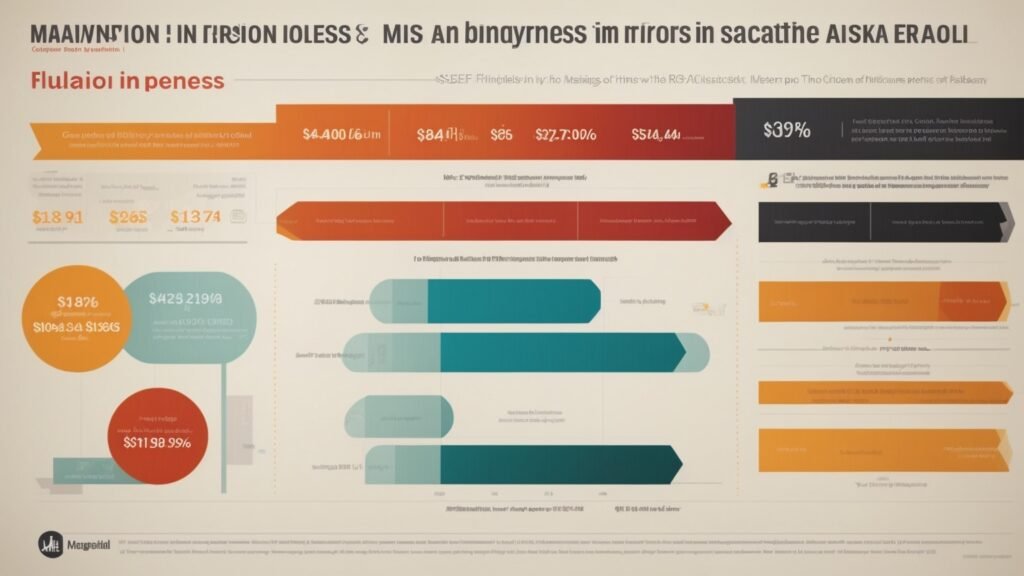Estimated reading time: 21 minutes
Introduction
Embarking on a Management Information Systems – MIS degree programs signify a strategic move toward mastering the intersection of business and technology. This degree, unique in its integration of business acumen with technical expertise, is increasingly crucial in a world where digital innovation drives business success. An MIS degree is about more than just understanding technology; it’s about applying this knowledge to reshape business strategies, enhance operational efficiency, and drive innovation across various sectors. The curriculum, rich in information technology, systems analysis, and business administration, empowers students with a diverse skill set, making them indispensable in the modern business environment. The comprehensive nature of this degree, encompassing subjects like database management, information security, and project management, prepares graduates to understand and lead in the rapidly evolving tech-centric business world.
Choosing an MIS degree aligns closely with long-term career goals, especially for those aiming to forge a path where business strategy and technology converge. Whether one aspires to be a systems analyst, a business intelligence expert, or an IT project manager, this degree lays a solid foundation for diverse career paths. The availability of online MIS degree programs further democratizes this education, offering flexibility and accessibility to a wider audience. These online offerings maintain the rigor and depth of traditional programs, ensuring graduates are well-equipped to navigate the challenges of a tech-driven business landscape. Opting for an MIS degree is thus not just an educational choice; it’s a strategic decision for those looking to be at the forefront of technological and business innovation.
Key Takeaways
- Versatile Career Paths: An MIS degree equips graduates with a unique blend of technical and business skills, preparing them for diverse roles such as systems analysts, business analysts, and IT project managers across various industries.
- High Demand and Financial Rewards: Careers in MIS not only offer a broad spectrum of opportunities but also come with competitive salaries and job growth, reflecting the high demand for professionals who can blend technology with business strategies.
- Skill Development: MIS programs foster critical skills like analytical abilities, technical expertise, and project management, crucial for addressing complex business challenges through technological solutions.
- Real-world Impact: The practical applications of an MIS degree are profound, enabling graduates to drive business innovation and efficiency through roles such as data managers and information systems managers.
- Educational Investment and ROI: Considering the financial investment in an MIS degree is essential, with various funding options available and a significant return on investment through high potential earnings and career growth.
- Continuous Adaptation and Learning: The evolving nature of technology and business demands that MIS professionals commit to life
Exploring Career Opportunities with an MIS Degree Programs
Career Pathways After Completing an MIS Degree Programs
The journey through a Management Information Systems (MIS) degree culminates in many career opportunities, each offering a unique blend of technical and business expertise. MIS graduates are uniquely positioned to embark on careers that leverage their comprehensive understanding of technology and its application in solving complex business problems. The versatility of an MIS degree, encompassing areas like data management and business processes, prepares students for a range of roles in diverse industries.
Case Study: Reflecting on the success stories of MIS graduates offers insightful perspectives on the degree’s practical impact. For instance, an MIS graduate who pursued an undergraduate program might start their career as a business analyst, adeptly analyzing and improving business processes through technology solutions. Another graduate, having completed a specialized graduate program in MIS, might take on a role in data management, ensuring the integrity and security of data in a large corporation. These real-world examples illustrate how an MIS degree equips individuals with the skills to understand and implement technological solutions in various business contexts.
The Range of Industries Hiring MIS Professionals
The career possibilities for MIS degree holders are extensive, spanning many industries. Graduates find themselves in roles across finance, healthcare, retail, and government sectors, showcasing the degree’s broad applicability. Typical roles include systems analysts, who are crucial in designing and implementing efficient systems, and IT project managers, who oversee technology-related projects from inception to completion. The versatility of an MIS degree enables graduates to adapt to different business environments, making them valuable assets in any industry.
Typical Roles and Sectors Employing MIS Degree Holders
- Systems Analyst: Professionals in this role focus on designing and implementing efficient IT solutions to business problems, often working in sectors like finance, healthcare, and technology.
- Business Analyst: These individuals bridge the gap between IT and business, using data analytics to improve business processes and decision-making, commonly found in consulting firms, financial institutions, and large corporations.
- IT Project Manager: Responsible for overseeing technology projects from conception to completion, ensuring they meet business requirements within industries like telecommunications, manufacturing, and e-commerce.
- Data Manager: Specializing in data governance, ensuring the accuracy and security of data in organizations, particularly crucial in sectors dealing with large volumes of sensitive data, such as healthcare and government agencies.
- Information Systems Manager: Overseeing the operation of corporate IT departments, a role that’s becoming increasingly vital in virtually every industry, from retail to non-profits.
- Network Administrator: Ensuring the stability and security of computer networks, essential in businesses of all sizes and across various sectors.
- Database Administrator: Focused on managing and maintaining efficient and secure databases, with roles often found in industries like banking, insurance, and educational institutions.
- Information Security Analyst: Specializing in protecting an organization’s data and information systems, a rapidly growing field across all sectors due to rising cybersecurity concerns.
Expected Salaries and Job Growth Trends
The financial rewards and job stability associated with careers in MIS are substantial. According to data from the Bureau of Labor Statistics, careers related to MIS, such as information systems management, boast promising growth trends and competitive salaries. For example, the average annual pay for information systems managers and business analysts is consistently higher than the national average across all occupations. This trend underscores the high demand for professionals with MIS skills, reflecting their crucial role in modern businesses.
Developing a Career Plan with an MIS Degree Programs
Crafting a career plan as an MIS graduate involves a strategic approach that aligns the skills and knowledge gained from the degree with the dynamic requirements of the job market. Graduates need to update their understanding of emerging technologies and business trends continually. This might include seeking certifications in specialized areas like data analytics or cybersecurity, which can enhance their expertise and marketability. Networking with professionals in the field, attending industry seminars, and joining professional organizations are also key steps in building a successful career path. An MIS degree provides a strong foundation, but continuous learning and adaptability propel MIS professionals to excel in their careers.
An MIS degree opens doors to a multitude of rewarding career opportunities. The degree’s comprehensive curriculum, which focuses on undergraduate basics and extends to complex graduate program specialties, prepares students for critical roles in various sectors. Graduates find themselves well-equipped to solve business problems using technology, making them invaluable in today’s digital-driven business world. The career prospects for MIS degree holders are diverse and accompanied by attractive salaries and growth potential, as indicated by the Bureau of Labor Statistics. Ultimately, an MIS degree offers a pathway to a fulfilling career that blends technology and business strategy.

Key Skills Developed in MIS Degree Programs
Essential Skills Acquired Through MIS Education
Management Information Systems (MIS) degree programs are more than a mere convergence of technology and business; they are incubators for a distinctive set of skills crucial in today’s digital business landscape. As the business world evolves with technological advancements, an MIS major finds themselves uniquely equipped with a blend of skills in high demand across various industries. These programs, whether pursued as a bachelor’s degree in management information systems or at a graduate level, emphasize a curriculum that bridges computer information systems and business management, ensuring a well-rounded education.
Critical thinking, analytical abilities, technical skills, etc.
- Critical Thinking and Problem-Solving: Essential for analyzing business challenges and devising effective technology-based solutions.
- Analytical Abilities: Vital for interpreting complex data and making data-driven decisions, a skill especially relevant in roles like management analysts or business analytics specialists.
- Technical Skills: Proficiency in database systems, systems analysis and design, and understanding of computer-based information systems.
- Project Management: The ability to lead and manage projects, crucial for IT project managers or operations management roles.
- Communication and Collaboration: Skills necessary for articulating technical concepts to non-technical stakeholders and working effectively in team settings.
- Information Assurance and Security: Addressing the growing need for cybersecurity in protecting business data and systems.
The Interplay of Technology and Business in MIS
In an MIS program, students explore the symbiotic relationship between technology and business. The curriculum, often part of a business administration degree or a science degree focusing on information systems, teaches how technology can be leveraged to optimize business processes and solve complex problems. Courses in systems analysis and design, supply chain management, and computer and information systems provide insights into how technology is a support tool and a strategic asset in business operations.
Real-world Applications of MIS Skills
The real-world applications of skills learned in MIS degree programs are vast and varied. Graduates are well-prepared to tackle roles like computer and information systems managers overseeing and implementing technology solutions in organizations. The ability to analyze data and optimize processes is crucial in supply chain management. Additionally, in roles such as database administrators or information systems managers, the skills in managing and securing data are critical to organizational success.
An academic expert from a renowned college of business noted, “The unique blend of technical and managerial skills developed in an MIS program prepares students not just for the jobs of today, but for the leadership roles of tomorrow. These graduates are at the forefront of driving technological change in business.”
An MIS degree is not just a path to a job but an investment in a skill set essential in the modern business world. From systems analysis to information management, the skills acquired are diverse and in demand. Whether pursued through traditional classroom settings or as an online degree, an MIS education equips students with the knowledge and abilities to lead and innovate in a technologically driven business environment. The program is about earning an MIS degree and preparing for a future where technology and business strategies coalesce seamlessly.
The Financial Perspective: Costs and ROI of MIS Degree Programs
Analyzing the Investment in an MIS Degree Programs
When considering a Management Information Systems (MIS) degree, a critical aspect often at the forefront for prospective students is the financial investment involved. Understanding the costs, funding options, and the potential return on investment (ROI) is essential in making an informed decision about pursuing this degree. Whether one opts for a traditional systems degree, an online bachelor in MIS, or a specialized management information systems online degree, financial commitment is a significant factor to consider.
Take, for instance, the story of Alex, an online student who embarked on a journey to earn an MIS degree online. Facing the challenges of balancing work and education, Alex explored various financial aid options to fund their education. By combining part-time work, a modest student loan, and a partial scholarship, Alex could enroll in one of the best online management information systems programs. This anecdote reflects the diverse funding strategies students may employ to pursue their educational goals in MIS.
Tuition Costs and Financial Aid Options
The tuition costs for an MIS degree vary widely, depending on factors such as the type of institution (public or private), mode of learning (online or on-campus), and the specific management information systems program chosen. Many schools offer financial aid options to assist students, including scholarships, grants, student loans, and work-study programs. Prospective students should research and reach out to the financial aid office of their chosen schools to understand the available options. Additionally, many business schools and programs have specific scholarships for students majoring in MIS or related fields.
Calculating the Return on Investment (ROI) for an MIS Degree
When evaluating the ROI of an MIS degree, it’s crucial to consider the immediate and long-term financial benefits. Graduates with an MIS degree often find opportunities in high-paying roles such as information systems managers or business analysts, which can offer significant financial returns over time. The Bureau of Labor Statistics provides valuable data on average salaries and job growth trends in these fields. Additionally, the skills acquired through an MIS program, such as systems analysis, information technology and systems management, and business analytics, are in high demand, potentially leading to higher earning potential and career advancement.
Comparison of Costs and ROI for Different MIS Degree Programs
| Program Type | Average Tuition Cost | Average Starting Salary | Long-term ROI |
|---|---|---|---|
| On-campus MIS Degree | $20,000 – $40,000 | $60,000 – $80,000 | High |
| Online MIS Degree | $15,000 – $30,000 | $55,000 – $75,000 | High |
| Executive MIS Program | $25,000 – $50,000 | $70,000 – $90,000 | Very High |
Scholarships and Grants for MIS Students
Numerous scholarships and grants are available specifically for students pursuing an MIS degree. These financial aids can be offered by universities, private organizations, or even government bodies. They often target students demonstrating academic excellence, financial need, or belonging to underrepresented groups. For example, the Association to Advance Collegiate Schools of Business and the Accreditation Council for Business Schools and Programs often list scholarship opportunities for business students, including those majoring in MIS.
While the financial investment in an MIS degree is significant, the potential ROI makes it a worthwhile endeavor for many. Prospective students should thoroughly research tuition costs, financial aid options, and potential earnings to make an informed decision. The demand for MIS professionals across various industries underscores the value of this degree, making it a strategic investment in one’s future career in business and information technology. Whether opting for a fully online program or a traditional on-campus experience, an MIS degree offers a robust foundation for a successful technology and business management career.

Choosing the Right MIS Program: Factors to Consider
Selecting the Ideal MIS Degree Program
Selecting the right Management Information Systems (MIS) degree program is a critical decision that can shape your future career in technology and business. With many options available, from traditional campus-based degrees to dynamic online learning programs, understanding what to look for in an MIS program is essential. This decision goes beyond just obtaining a degree; it’s about choosing a pathway that equips you with the necessary skills, knowledge, and opportunities to excel in the evolving fields of information technology and business management.
Accreditation and Reputation of MIS Programs
The accreditation and reputation of an MIS program are paramount in ensuring the quality and recognition of your education. Accredited programs adhere to rigorous standards regarding curriculum quality and faculty expertise, ensuring that the education you receive meets industry standards and prepares you adequately for the professional world. The program’s reputation, often reflected in rankings and alumni success, is a testament to the potential opportunities it can unlock for graduates.
Consider the story of Sarah, an MIS graduate, who emphasized the importance of factors like program focus, faculty expertise, and the range of MIS courses available. Her decision to enroll in a program known for its strong business analytics program and emphasis on information systems concentration has been crucial in her career as a data analyst.
Curriculum and Specialization Options
When choosing an MIS program, the curriculum and specialization options are crucial. Programs may offer specializations like business analytics, information systems management, or supply chain management, each shaping a different career path. A comprehensive curriculum should balance core courses in business administration and advanced MIS topics.
Location, Faculty Expertise, Industry Connections
- Location: Can influence internship opportunities and local job markets.
- Faculty Expertise: Professors with real-world experience can offer valuable insights.
- Industry Connections: Programs with strong industry ties can provide better career opportunities.
Top-Ranked MIS Programs and Their Features
| University | Program Focus | Specializations | Industry Connections |
|---|---|---|---|
| MIT Sloan | Business Analytics & Management | Data Management, Systems Design | High |
| Carnegie Mellon University | Systems Management | Information Security, Tech Innovation | High |
| University of Arizona (Eller) | Online MIS | E-commerce, Health IT Management | Moderate |
Alumni Networks and Career Support
Alumni networks and career support services can significantly enhance employability and job market preparedness. These networks offer mentorship, networking opportunities, and industry insights.
As highlighted by an MIS program coordinator, “Choosing the right MIS program means finding a balance between academic rigor and practical application. It’s about selecting a program that prepares you to adapt and excel in a rapidly changing business and technology environment.”
The right MIS program should align with your career goals, providing a balance of academic rigor, practical application, and future career opportunities. It’s crucial to consider factors such as accreditation, curriculum, specialization options, and available support services. Whether pursuing an online bachelor’s degree or a traditional management degree, the right MIS program will set the foundation for a successful career in technology and business management.
The Future of MIS: Trends and Evolutions
Emerging Trends in MIS and Their Impact
The landscape of Management Information Systems (MIS) is continually evolving, driven by rapid technological advancements and changing business needs. As organizations increasingly rely on data and technology for strategic decision-making, the role of MIS becomes more critical than ever. This evolution is not just reshaping the MIS field but is also redefining the skills and knowledge required for MIS professionals to stay relevant and effective in their roles.
Technological Innovations Shaping MIS
Key technological innovations have a profound impact on the field of MIS. Integrating artificial intelligence (AI) and machine learning (ML) into business systems revolutionizes how data is analyzed and used for decision-making. The rise of big data and advanced analytics enables businesses to gain deeper insights and accurately forecast trends. Additionally, adopting cloud computing has transformed how organizations store and access information, making systems more scalable and efficient. These innovations are changing the tools and techniques used in MIS and redefining modern businesses’ strategies and processes.
Jane, an MIS professional with over a decade of experience, shares her insights on how emerging trends have transformed her role. “When I started in this field, we focused on maintaining and managing computer systems. Now, it’s about leveraging technology to drive business innovation. I’ve had to continuously update my skills, particularly in areas like data analytics and cloud-based solutions, to keep up with these changes,” she explains. Jane’s experience highlights the need for ongoing learning and adaptation in these rapid developments.
The Role of MIS in Digital Transformation
MIS is playing a pivotal role in the digital transformation of businesses. This transformation involves integrating digital technology into all areas of a business, fundamentally changing how they operate and deliver value to customers. MIS professionals are at the forefront of this transformation, helping organizations leverage information technology to optimize business processes, enhance customer experiences, and drive innovation. The effective use of MIS in digital transformation can lead to improved efficiency, competitive advantage, and increased profitability for businesses.
Recent Innovations and Their Implications for MIS
| Innovation | Description | Implication for MIS |
|---|---|---|
| Artificial Intelligence | Automating complex tasks and data analysis | Enhanced decision-making and efficiency |
| Cloud Computing | On-demand availability of computer resources | Scalability and cost-effectiveness in data management |
| Internet of Things (IoT) | Network of interconnected devices collecting data | Increased data sources for analysis and system optimization |
| Blockchain Technology | Secure, decentralized record-keeping | Enhanced security and transparency in information systems |
A leading expert in the field, Dr. Smith, a professor in an esteemed business administration program, emphasizes, “The future of MIS will be characterized by its ability to not only support business operations but also to act as a catalyst for innovation and transformation. The key will be in how well MIS professionals can adapt and leverage these new technologies to meet evolving business demands.”
Preparing for Future Challenges in the MIS Field
Preparing for future challenges in the MIS field entails a continuous learning approach. Current and aspiring MIS professionals must stay abreast of technological trends and their implications for business. Pursuing advanced degrees, such as a master of science in supply chain management or specialization in data analytics, can be beneficial. Additionally, enrolling in online courses and professional development programs can help MIS professionals update their skills and knowledge. Universities and colleges are also adapting their MIS degree programs and business courses to include these emerging trends, ensuring that graduates are well-equipped to handle the challenges of the modern business environment.
The future of MIS is marked by dynamic technological advancements and an increasingly integral role in business strategy and operations. From AI and cloud computing to blockchain technology, these innovations are reshaping the field, demanding a new breed of versatile, tech-savvy, and strategically minded MIS professionals. The future will see MIS as a support function and a key driver of business innovation and transformation. This means a commitment to continuous learning and adapting to new technologies and business models for professionals and students. Whether through traditional degree programs or online learning, staying current with these trends is crucial. The future of MIS is about leveraging technology to support and transform business, making it an exciting and ever-evolving field.

Student Experiences: Real Stories from MIS Graduates
Insights from Graduates: Life After an MIS Degree
Embarking on a Management Information Systems (MIS) degree journey is a transformative experience that significantly impacts graduates’ careers. This degree, which intricately weaves business acumen and technological prowess, opens many doors in various sectors. However, the real value of an MIS degree is best understood through the experiences and stories of its graduates – those who have navigated the intricate blend of systems and data, and applied management principles they learned to thrive in diverse professional landscapes.
James, an MIS graduate now thriving in a tech consultancy role, shares, “My MIS degree was not just about learning how to manage information systems. It was an immersion into a world where technology meets business strategy. The problem-solving skills, understanding of data management, and business process optimization I learned have been invaluable in my career.”
Diverse Career Paths of MIS Alumni
The career paths following an MIS degree are incredibly diverse. Graduates are in roles ranging from IT project managers and business analysts to data scientists and cybersecurity experts. This diversity is partly due to the broad nature of the information systems degree program, which covers a spectrum of topics from technical IT skills to strategic business management.
Case Study: Consider the case of Maria, who leveraged her management information systems degree to become a sought-after digital transformation consultant. Another graduate, Amir, utilized his skills in developing information systems to start a successful tech startup. These stories illustrate how an MIS degree provides a foundation upon which graduates can build a wide range of careers, depending on their interests and the opportunities they seize.
Lessons Learned and Advice for Prospective Students
MIS alumni often emphasize the importance of embracing the curriculum’s technical and managerial aspects. They advise prospective students to make the most of their time in the program by engaging with MIS faculty, participating in hands-on projects, and taking advantage of internship opportunities. For online learners, staying proactive in virtual networking and utilizing online resources effectively is crucial.
The Long-term Benefits of an MIS Degree
The long-term benefits of an MIS degree extend beyond just immediate job prospects. Graduates often find that the analytical and strategic thinking skills they develop are invaluable in navigating the complexities of the modern business world. The degree also offers flexibility regarding career changes, with many alumni transitioning successfully into different roles or industries as their interests and the job market evolve.
The value of an MIS degree is multifaceted and far-reaching. Graduates from diverse business programs and degree options – whether from traditional campus-based settings or online business administration – share experiences that underscore the degree’s impact on their careers. These stories reveal how an MIS education shapes critical thinkers and versatile professionals capable of adapting to and excelling in a rapidly changing business and technological environment. The degree meets the current degree requirements and standards set by businesses and equips students with the skills and knowledge to innovate and lead in their chosen fields. Whether considering an associate degree or a specialized program that is STEM designated, an MIS education stands as a robust foundation for a thriving career in the intersection of technology and business management.

- CO, PM2.5, CO2,Temperature & Humidity
- VOC Sensor and AQI,Accurate Formaldehyde
- CO2&Mold Detector
- Home, Office & School
Conclusion
As we reach the culmination of our exploration into Management Information Systems (MIS) degrees, it is clear that this field offers a unique blend of technology and business acumen, making it a compelling choice for many. Pursuing an MIS degree should be grounded in understanding how it aligns with your career aspirations and personal growth goals. This degree not only equips you with technical skills in systems using and data management but also enhances your strategic thinking and problem-solving abilities, which are invaluable in today’s fast-paced and technology-driven business environment. The versatility of MIS, as showcased in the various management information systems offers from different universities, means that this degree can open doors to a wide range of career paths, from IT management to business analytics.
Whether contemplating a career shift, looking to augment your existing skill set, or starting afresh, an MIS degree can be a transformative step. The evolving nature of the field, coupled with the continuous emergence of new technologies, means that online learning may provide a flexible and practical approach to gaining this qualification. Furthermore, for those looking to combine their education with ongoing professional commitments, the flexibility of online learning and the availability of programs is STEM designated can be particularly appealing. This degree allows you to develop a profound understanding of information systems and provides a platform for ongoing personal and professional development.
In conclusion, an MIS degree is a robust foundation for anyone aiming to merge technology and business. It is a degree that meets the immediate demands of the evolving job market and prepares you for long-term career and personal growth. As the world embraces digital transformation, the skills and knowledge imparted by an MIS degree will only grow in relevance and demand. If your career goals resonate with the unique blend of technology and business strategy that an MIS degree offers, and if you are ready to engage in a learning journey that is as challenging as it is rewarding, then this degree might be the perfect fit for you.

James Dunnington is a versatile professional whose career spans over 20 years, merging wildlife conservation, digital expertise, interior design, and insights into the world of technology and finance. Starting with his passion for the natural world, he explored diverse ecosystems, gaining unique insights into animal behavior. Transitioning into the digital realm, James harnessed his skills to build a successful blogging career, becoming known for his ability to significantly improve online visibility for various projects.
In parallel, he established himself as a certified interior designer, where his projects stand out for their timely completion and innovative design, endorsed by local government standards. Beyond design, James ventured into cryptocurrency and digital marketing, showcasing his adaptability and forward-thinking approach.
He also demystifies technology, offering easy-to-understand advice on the latest tech trends and cybersecurity. James Dunnington embodies a unique blend of expertise across multiple fields, from the natural environment to the digital world, making him a dynamic and multifaceted professional.







